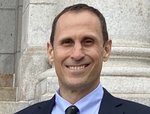
Learn something new every day. This isn't a new concept. Many smart people have espoused the virtues of learning.
"Education begins at the level of the learner," said Aristotle, who believed education was the key to the whole development of a person and the primary path to living a full life and becoming a satisfied human being.
Ralph Waldo Emerson said, "Knowledge is when you learn something new every day. Wisdom is when you let something go every day."
Martha Stewart agreed: "If you learn something new every day, you can teach something new every day."
Besides the philosophical and practical benefits of learning, there also is a health benefit. According to Vox:
"Learning changes the brain: Existing bonds between neurons — nerve cells that send messages signaling everything from breathing to thinking — are strengthened; new pathways between neurons are developed. Repeated exposure to an activity, like knitting or driving a car, strengthens these connections, and thus, we learn. Over time, recalling these skills or memories becomes easier. As we get older and are no longer exposed to organized classroom settings, acquiring fresh knowledge holds value. Studies have suggested that learning later in life may preserve cognitive function — which refers to the ability to acquire knowledge, reason, and manipulate information — and those who have completed college had higher levels of cognitive function in their 50s than those who did not. “I think you can broadly say,” says Hadley Bergstrom, an associate professor of psychological science at Vassar College. “that new learning over long periods of time is likely going to improve cognition as you age."
I learned something new the other day talking to my friend Holly Kleppe, the principal at Ella Baker School in Minneapolis. Holly told me Ella Baker had some open teaching and staff positions to fill for the 2023-24 school year. She added that over 50,000 teachers and educational staff across the United States had left the profession in 2023.
Zoom out a little farther, and over 500,000 public school teachers and other education-related staff have quit their jobs since 2020. The resignations—a result of teachers feeling stressed and burned out—peaked after the start of the COVID-19 pandemic, then decreased, but they are on the rise again. The teacher shortage was a problem. Now it's becoming a bigger problem as districts struggle to hire new teachers and some current teachers say they are likely to quit and find a new job in the next two years.
A lack of teachers has a direct impact on the learning potential and growth opportunities for students.
A few days after talking with Holly, I learned something else from my friend Adriana Cerrillo, a director with the Minneapolis Board of Education and caregiver (aunt) of an eighth-grade student at Ella Baker. Adriana told me many young Ella Baker students in fourth grade and younger are reading below grade level.
This isn't just a local issue. According to the National Assessment of Educational Progress (NAEP), more than two-thirds (68 percent) of U.S. fourth graders are not proficient in reading. It's become a national priority with a public health objective to increase fourth-grade reading proficiency by 2030.
There's a reason for the urgency. As the Annie E. Casey Foundation reports, fourth grade marks a critical transition year when kids go from learning to read to reading to learn other subjects in school. Children who reach fourth grade unable to read well are more likely to drop out of high school. Not graduating reduces their earnings potential and chances for success. Kids with poor reading skills are also more likely to engage in high-risk behavior during adolescence.
It's hard to learn when you can't read. To address this problem and help students increase their reading skills, we are starting a reading volunteer program at Ella Baker School with the LHENA Volunteer Network (LVN) of the Lowry Hill East Neighborhood Association. Reading volunteers will come to Ella Baker and read to K-3rd graders. It's a start, but many students are also behind in math, another critical subject.
Times have changed. So we need to change with the times. Teachers and parents need more help to educate students than in the past. The community can provide that help and support schools and youth development programs.
One of those programs is Career and Technical Education (CTE), a national academic program that prepares learners for their future. The Minneapolis CTE is led by Michael Luseni and available to all 10-12 grade MPS students interested in earning college credit or receiving job certifications for free.
Adriana connected Michael and me. Together, we plan to explore a partnership with our community solutions program to increase meaningful employment opportunities for youth.
It's easier to succeed when you know how to learn.
Eric Ortiz lives in the Wedge with his family. When he’s not community building, he’s the head of content and strategy for Big Edition and writes bilingual children’s books with his kids. Their first book, “How the Zookalex Saved the Village,” is available in English and Spanish.
Comments
No comments on this item Please log in to comment by clicking here